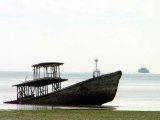PHUKET: Two of the most important deficiencies in Thailand are just as evident on Phuket as they are elsewhere around the country. Just imagine how competitive Phuket and Thailand could be if the money that lined the wrong pockets in corruption payments went into the areas where it is most needed.
Here are entries 6 and 7 in Phuketwan's PHUKET 10/10 series, designed to highlight Phuket's often overlooked needs.
A TOURIST from Singapore wondered how long it would be before a helicopter arrived to carry his injured friend off Patong beach to a Phuket City hospital. The answer: many more years yet. While Phuket's hospital doctors and nurses do a wonderful job, health and safety are still not the priorities they should be for tourists, or for residents. The days may have passed when it was common to have patients transferred from the scene of a crash to hospital in the back of a pickup, with a paramedic holding aloft a saline drip. But it still takes far, far too long for an ambulance to reach drowning victims at most Phuket beaches when every second counts in saving a life. As for the heroic struggle of Phuket's public hospitals to cope with too many patients . . . a visit to Vachira Phuket when the wards are filled to overflowing gives a good indication of the levels of government support. A trip to the hospital morgue, largely in the open air out the back, confirms that even the 2004 tsunami did not persuade Bangkok to spend on Phuket's preparedness for disaster. And if you happen to become lost at sea, do not expect an aerial search. A group of survivors from a dive boat capsize in which seven people drowned in 2009 had to hail a passing fisherman and use his mobile telephone to call in their own rescue. Phuket still has to send bodies to Bangkok or Surat Thani for autopsy. The big ''what if'' is, will Patong Hospital be able to cope if or when there is a big bus crash on the Patong side of the hill, and ambulances from the better-equipped east coast hospitals are not able to get through? Stop corruption: health and education need the cash.
A EUROPEAN friend with Thai children entrusted them to the best local school on Phuket, where his son topped the class. But when the 15-year-old had to head to Europe and a new school, he was put back two years, in with the 13-year-olds. That's the scale of the gap between public schools on Phuket and throughout Thailand and schooling overseas. A better education can be bought by the fortunate few at the private schools that have proliferated with the internationalisation of Phuket. But many local Phuket children face big classes, rote learning and a future where their potential will be forever unfulfilled. Teaching children how to think needs to be the priority, not computer tablets and gimmicks that win popular acclaim but really don't address the chronic issue. Kill corruption, invest the money in necessities, and Phuket's children stand a fair chance.
The countdown for our PHUKET 10/10 series continues soon with seven items listed, and Prime Minister Yingluck Shinawatra and her Cabinet due to meet on Phuket on Tuesday.
Here are entries 6 and 7 in Phuketwan's PHUKET 10/10 series, designed to highlight Phuket's often overlooked needs.
6. Health Should be a Priority
A TOURIST from Singapore wondered how long it would be before a helicopter arrived to carry his injured friend off Patong beach to a Phuket City hospital. The answer: many more years yet. While Phuket's hospital doctors and nurses do a wonderful job, health and safety are still not the priorities they should be for tourists, or for residents. The days may have passed when it was common to have patients transferred from the scene of a crash to hospital in the back of a pickup, with a paramedic holding aloft a saline drip. But it still takes far, far too long for an ambulance to reach drowning victims at most Phuket beaches when every second counts in saving a life. As for the heroic struggle of Phuket's public hospitals to cope with too many patients . . . a visit to Vachira Phuket when the wards are filled to overflowing gives a good indication of the levels of government support. A trip to the hospital morgue, largely in the open air out the back, confirms that even the 2004 tsunami did not persuade Bangkok to spend on Phuket's preparedness for disaster. And if you happen to become lost at sea, do not expect an aerial search. A group of survivors from a dive boat capsize in which seven people drowned in 2009 had to hail a passing fisherman and use his mobile telephone to call in their own rescue. Phuket still has to send bodies to Bangkok or Surat Thani for autopsy. The big ''what if'' is, will Patong Hospital be able to cope if or when there is a big bus crash on the Patong side of the hill, and ambulances from the better-equipped east coast hospitals are not able to get through? Stop corruption: health and education need the cash.
7. What are Schools For?
A EUROPEAN friend with Thai children entrusted them to the best local school on Phuket, where his son topped the class. But when the 15-year-old had to head to Europe and a new school, he was put back two years, in with the 13-year-olds. That's the scale of the gap between public schools on Phuket and throughout Thailand and schooling overseas. A better education can be bought by the fortunate few at the private schools that have proliferated with the internationalisation of Phuket. But many local Phuket children face big classes, rote learning and a future where their potential will be forever unfulfilled. Teaching children how to think needs to be the priority, not computer tablets and gimmicks that win popular acclaim but really don't address the chronic issue. Kill corruption, invest the money in necessities, and Phuket's children stand a fair chance.
The countdown for our PHUKET 10/10 series continues soon with seven items listed, and Prime Minister Yingluck Shinawatra and her Cabinet due to meet on Phuket on Tuesday.













